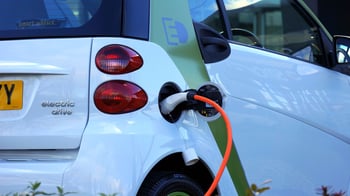 The number of electric vehicles (EV's) on the road is continuing to rise from about 1 million at the end of 2018 to a projected 18.7 million by 2030. Concurrently, fleet management organizations are promoting the incorporation of EV's into their clients' fleets more than ever before. So what should you know about vehicles that run on electricity?
The number of electric vehicles (EV's) on the road is continuing to rise from about 1 million at the end of 2018 to a projected 18.7 million by 2030. Concurrently, fleet management organizations are promoting the incorporation of EV's into their clients' fleets more than ever before. So what should you know about vehicles that run on electricity?
For the next few weeks, our blog will focus on the rise of the EV by reviewing important definitions, researching the facts and reviewing theories surrounding the viability of electric vehicles within a fleet.
Now, for the basics...
What is an electric vehicle?
An electric vehicle (EV) runs either entirely on electricity from the car's power grid or supplements petroleum use with electricity. There are multiple classifications of EV's.
Types of EV's
There are three commonly-mentioned "types", or classifications, of electric vehicles. Each uses electricity differently in order to reduce fuel costs, cut petroleum consumption, and reduce tailpipe emissions.
Battery-Electric Vehicles (BEV's) are fully-electric. Their rechargeable batteries power everything from the electric motor to the on-board electronics like the radio and dash display. Power is gained by charging your BEV with a cable that attaches to an external power source such as a home outlet or public charging station (more about charging your EV in next week's blog). Their range on a full charge is fast improving, so the practicality of owning an electric vehicle has dramatically increased in recent years. The average range of a BEV is anywhere from 80-200 miles, while some luxury models (or middle-of-the-line models with upgraded batteries) can run up to around 250 miles.
Some examples of common BEV's:
- Tesla Model 3
- Chevy Volt
- Chevy Spark
- Nissan LEAF
- Kia Soul
- Tesla Model S
- Toyota Rav4
- Volkswagon e-Golf
Plug-In Hybrid Electric Vehicles (PHEV's) have both an electric motor and internal combustion engine. Their high-capacity batteries are charged by connecting a cable to an external power source and also via "regenerative braking", a traditional hybrid system that generates electricity when you use the brakes.
Whereas conventional hybrids have electric motors that work with the petroleum-powered engine to reduce fuel usage and are charged only by "regenerative braking", PHEV's run on electricity-only for as long as possible (anywhere from 6-40 miles depending on charge). When the grid runs out of power, the vehicle switches to an internal combustion engine that is powered by petroleum. The Chevy Volt (2014) can go around 38 miles on a full charge before the gasoline motor kicks in. Using 30% - 60% less petroleum than conventional vehicles, the fuel cost of driving a PHEV is greatly reduced. According to this infographic, the average cost to drive 100 miles on electricity is $3.45 with a PHEV, compared to $13.52 for a conventional, gasoline-powered car.
PHEV's are helpful for reducing your fleet's fuel costs and carbon emissions, but can be used for longer distance travel because of their ability to run on small amounts of fuel.
Some examples of common PHEV's:
- Hyundai Sonata
- Kia Optima
- Toyota Prius
- Chevy Volt
- Ford C-Max Energi
- Ford Fusion Energi
Hybrid Electric Vehicles (HEV's), or traditional "hybrids", are powered by both gasoline and electricity. Although they have an internal battery and electric motor, they cannot be plugged in and charged. Instead, the small amounts of electricity HEV's use is generated from "regenerative braking", a system where the energy usually converted to heat from braking is converted to electricity.
HEV's initially run on the electric motor, and switches to gasoline as the load increases or speed rises and is maintained. An internal computer makes the decision on when to switch, allowing for maximized fuel economy and lessening the vehicle's tailpipe emissions.
HEV's are an optimal choice for drivers who want to reduce their carbon "tireprint" but would rather not rely on a BEV's limited range or have to install a charging station at home.
Some examples of common HEV's:
- Toyota Prius Hybrid
- Honda Civic Hybrid
- Toyota Camry Hybrid
Stay tuned to our blog for next week's article on the basics of charging your electric vehicle. For any further inquiries or comments, please Contact Us!




